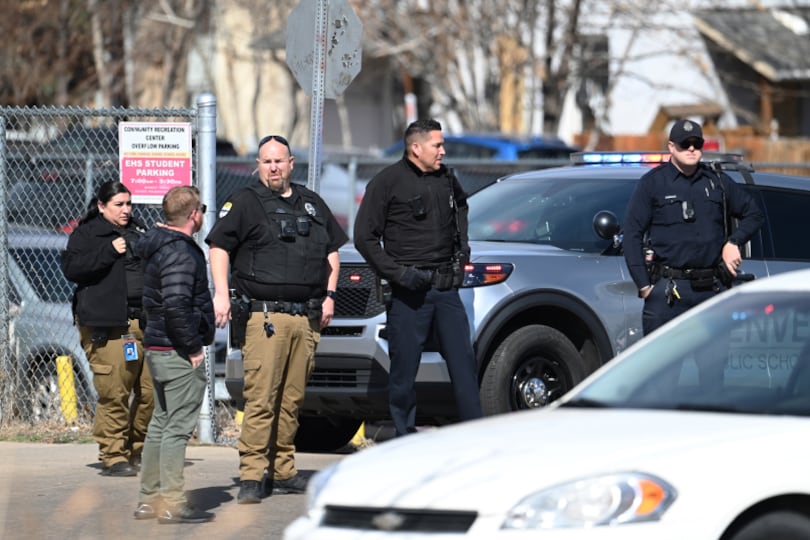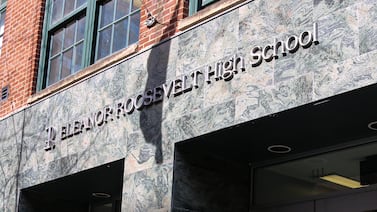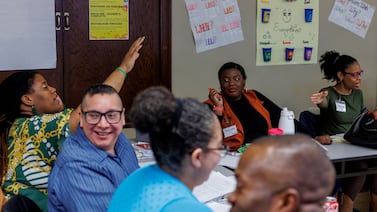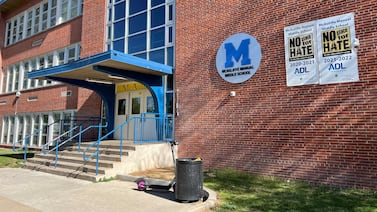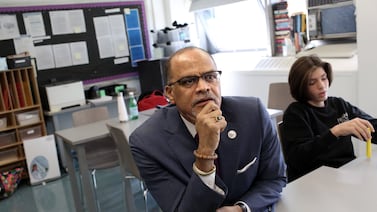Tickets and arrests of students at 13 Denver Public Schools campuses were lower when police officers were not stationed inside the school buildings than when they were, according to state and local data from the 2019-20 and 2022-23 school years.
The data backs a key criticism of school resource officers, which is that they increase tickets and arrests and feed the school-to-prison pipeline.
But when SROs were reintroduced on those 13 campuses for the last two months of the 2022-23 school year, after a shooting inside East High School, the monthly average of tickets and arrests did not go up, according to data from the Denver Police Department.
East High student Stella Kaye has a theory as to why.
When Kaye, a 16-year-old junior, thought about the data on SROs, “I thought about, Wow, they probably know how many people don’t want them to be there,” she said. “So if they start arresting kids left and right, it would not look good for the police or DPS. It’s almost like they had to be on their best behavior. It’s like they were put in their place a little bit.”
It’s a theory shared by parents, students, advocates, and elected officials on both sides of the issue. Those who support the return of SROs point to the data as a hopeful sign that students won’t be overpoliced. Those opposed to SROs are skeptical that two months of data, at a time when school safety was closely watched, proves that anything will be different.
When school starts in Denver next month, SROs will be back at the same 13 high school campuses. The data from the 2019-20 and 2022-23 school years provides a window — albeit a limited one — into what parents and students can expect.
DPS had SROs starting in the 1990s. In the 2019-20 school year, SROs were stationed at 18 middle and high schools. Those 18 campuses included the 13 that will have an SRO this fall.
In 2019-20, there were 30 student arrests and 160 tickets issued on those 13 campuses, according to the Colorado Division of Criminal Justice, which uses data from law enforcement agencies and school districts to track student interactions with police.
In the summer of 2020, amid nationwide protests against racist policing, the Denver school board unanimously voted to end DPS’ contract with the Denver Police Department. The 18 SROs were phased out of schools the following year, and gone by June 2021.
The pandemic made it difficult to assess the impact of removing SROs. The 2020-21 school year was largely remote for high school students, and the following year, 2021-22, was interrupted by returns to remote learning as COVID variants spiked.
This past school year, 2022-23, was the first prolonged test of in-person school without SROs. Data from the Denver Police Department shows that arrests and tickets at the 13 campuses were lower this past year than in 2019-20 when the campuses had SROs.
In 2022-23, there were 18 student arrests at the 13 campuses, compared to 30 in 2019-20 for those same campuses — a 40% decrease. Similarly, there were 75 tickets issued to students at the 13 campuses this past year, compared to 160 in 2019-20 — a 53% decrease.
A majority of the tickets — 57 of the 75 — were for assault or public fighting.
The 2022-23 data includes the months of April and May, when SROs were temporarily placed at the 13 campuses following a shooting inside East High on March 22. A 17-year-old student shot and injured two deans before fleeing and taking his own life.
After SROs were reinstated, the number of tickets and arrests at the 13 campuses held steady at about 10 incidents per month across all 13 campuses, the data shows. Most of the incidents were tickets. Only two students, both 15 years old, were arrested in that time period: one for third-degree assault and one for indecent exposure, according to the data.
School board member Scott Baldermann wrote the policy to reintroduce SROs. The policy includes a requirement that DPS monitor the number of times SROs ticket or arrest students to ensure marginalized students aren’t disproportionately targeted.
Before SROs were removed, Black students were targeted more often. In 2018-19, one in four tickets or arrests involved Black DPS students, even though only about one in seven students were Black, state data showed. The monitoring is meant to safeguard against racist policing.
“Now they’re being watched,” Baldermann said.
But the 2022-23 data also shows a disproportionality. White students were underrepresented in tickets and arrests, while Black students were overrepresented. A third of tickets and arrests in 2022-23 involved Black students, but only 14% of DPS students are Black.
Steve Katsaros, an East High parent who helped form a safety advocacy group after the March shooting, is supportive of SROs. But he said the bigger issue is DPS’ rules for when educators can suspend or expel students or call the police. Those rules are spelled out in a chart known as the discipline matrix, which DPS amended in 2021 to limit calls to police.
“The elephant in the room is that the discipline matrix says educators cannot refer to [the Denver Police Department],” Katsaros said.
Given the changes to the discipline matrix and other factors, such as the effects of the pandemic on students’ behavior, Katsaros said it’s hard to draw conclusions by comparing data from before and after remote learning. “The data can be twisted,” he said.
Elsa Bañuelos-Lindsay is also skeptical of the data. She is the executive director of Movimiento Poder, an advocacy organization that strongly opposed the return of SROs.
“Our worry as an organization is we will see an increase … in the criminalization of [Black, Indigenous, people of color] working-class young people,” Bañuelos-Lindsay said, and “a lot of schools relying on policing to deal with issues that should be dealt with in schools, like mental health.”
Seventeen-year-old Skye O’Toole is a student at Denver School of the Arts, which doesn’t have an SRO. At a closed-door school board meeting held the day after the East High shooting, Superintendent Alex Marrero said DSA had turned down the offer of an SRO this past spring, a recently released recording revealed.
But that’s no guarantee DSA won’t get an SRO sometime in the future. It’s an outcome that O’Toole, who is an active member of Marrero’s student cabinet, opposes.
Even though the recent data does not show a spike in tickets and arrests after SROs were reintroduced this past spring, O’Toole said she still fears that could happen.
“We can’t jump to any conclusions based on two months of data,” O’Toole said. “The first few months or the first few years, [the SROs are] likely going to be on their best behavior. They were being brought back with a lot of caution and concern around them.
“We can start judging the data more when we’re one or two years into the process. I have a feeling that arrests will go up. I’ll be watching very closely.”
Melanie Asmar is a senior reporter for Chalkbeat Colorado, covering Denver Public Schools. Contact Melanie at masmar@chalkbeat.org.


